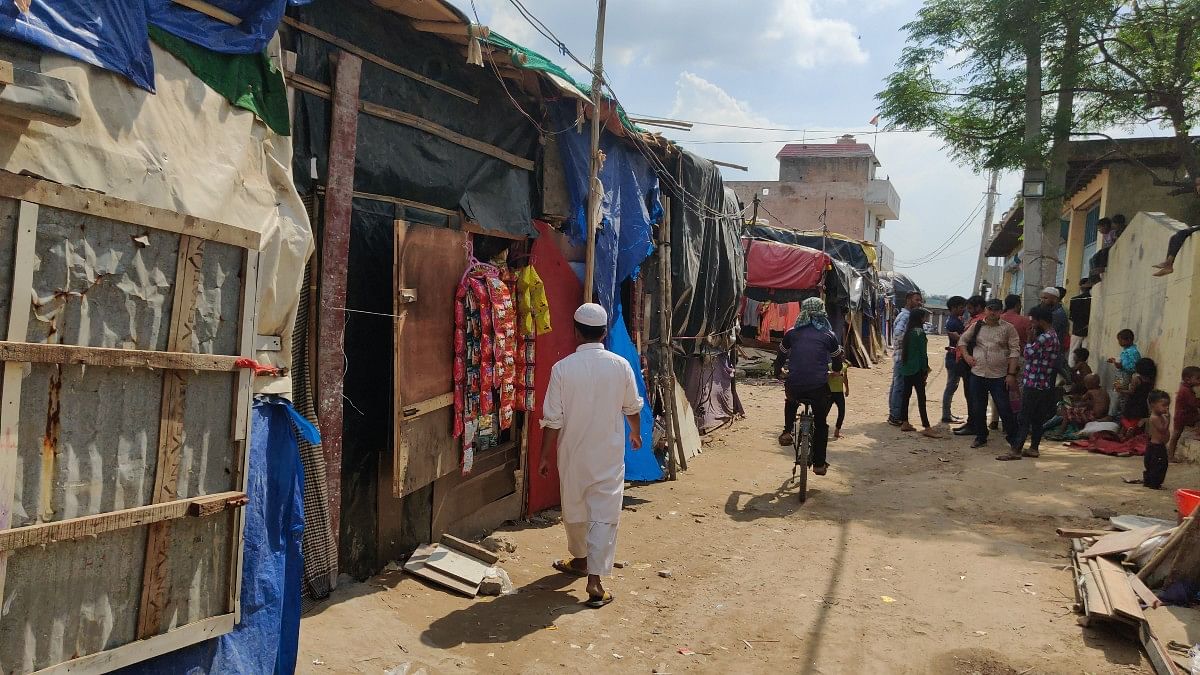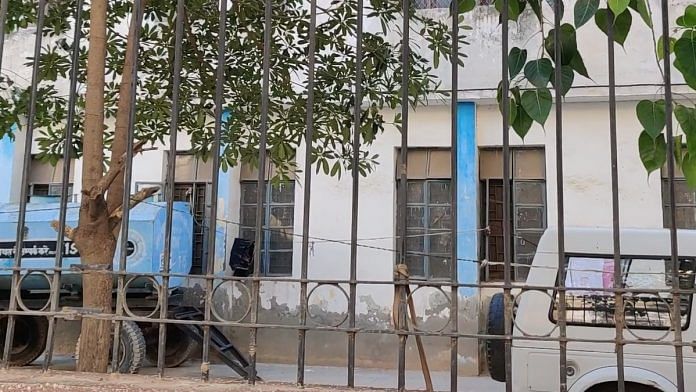New Delhi: The four-storey building presents a shabby sight. Located in the national capital’s Sarai Rohilla area, it is one of two detention centres run by the Delhi government where “illegal” immigrants, including Rohingyas and Bangladeshis, are rounded up and kept.
Its gates are locked. Two policemen and some government caretakers guard the premises, but say they are not permitted to speak to anyone.
The Rohingyas inside are not allowed to interact with outsiders either, the officials at the premises said, and none could be seen outside the building when ThePrint visited this week.
The only sign of activity inside was spotted through the windows.
“There are times when people are sobbing and crying right outside the gates to meet those inside, but they are not allowed to meet,” said Abdul (he did not provide a last name), who works in an industrial unit right next to the centre. “No one comes out. Students don’t go to school. They don’t let anyone go out. The gates never open.”
The Rohingyas are a persecuted minority in neighbouring Myanmar, and hundreds are said to live in India after having fled their home country.
India houses thousands of refugees, but is officially not a signatory to the United Nations refugee framework and doesn’t have a national policy in this regard. It has neither signed the UN 1951 Refugee Convention nor its 1967 protocol.
“While the Government of India deals differently with various refugee groups, in general it respects the principle of non-refoulement (not sending back refugees or asylum-seekers to persecuting territories) for holders of UNHCR (UN refugee agency) documentation,” the United Nations noted in a report.
The detention centre at Sarai Rohilla is one of two Delhi government facilities where Rohingyas who are believed to be in India illegally are rounded up and kept. The second one is the Seva Sadan deportation centre in Lampur, which also houses ‘illegal’ foreigners from various other countries.
Set up in line with Ministry of Home Affairs (MHA) guidelines, the centres serve as a temporary base until the government determines the status of the inhabitants. The Rohingyas are deported if their stay here is proved illegal, and allowed to stay on otherwise.
In March last year, the central government had also issued instructions to state governments and UT administrations to sensitise law enforcement and intelligence agencies about “taking appropriate steps for the prompt identification of illegal migrants, their restriction to specified locations as per provisions of law, capturing their biographic and biometric particulars, cancellation of fake Indian documents and for taking legal proceedings including initiation of deportation proceedings as per provisions of law”.
Over 1,000 Rohingyas also stay in a camp at Madanpur Khadar, which found itself in the limelight this week as a bizarre controversy brought India’s Rohingya policy under the scanner.
On Wednesday, Union Minister of Housing and Urban Affairs Hardeep Singh Puri retweeted a media report that claimed “all Rohingya refugees will be shifted to EWS flats in Bakkarwala area of Delhi. They will be provided basic amenities, UNHCR IDs & round-the-clock @DelhiPolice protection”.
The report in question talked about the alleged relocation of the estimated 1,100 Rohingyas at Madanpur Khadar.
Hours later, the Ministry of Home Affairs issued a denial, saying it has “not given any directions to provide EWS flats to Rohingya illegal migrants at Bakkarwala in New Delhi”.
“MHA has directed the Government of Delhi to ensure that the Rohingya illegal foreigners will continue at the present location at Kanchan Kunj, Madanpur Khadar as MHA has already taken up the matter of deportation of illegal foreigners with the concerned country through the Ministry of External Affairs,” it added.
As India works to decide their fate, the residents of the Madanpur Khadar camp, located close to the Delhi-UP border, speak of a difficult existence in a country where they are allegedly seen with suspicion by some sections.

When ThePrint approached a few people from the area for comments, they pointed to someone who was like a ‘leader-figure’ and said he was the best person to speak with.
This person was Salim (he did not provide a last name), a watchman who stays here with a family of five. He told ThePrint, “There were problems earlier as well but in the last 1.5 years, things have become particularly bad.”
Also Read: UNSG’s top envoy on Myanmar says Rohingyas speak about denial of education opportunities
‘Some people call us ‘atankwaadi’’
According to the residents ThePrint spoke to, there are around 250 people who have been living in the small area with about five to six family members in each household since 2012.
The camp is surrounded by pucca houses and a somewhat well-off neighbourhood. However, the refugees here live under sheets of canvas held up by bamboo sticks.
So tightly are the tents cramped in the camp that sunlight barely passes through even in peak afternoon hours. Among the tents stands a shop for basic necessities.
Children in the camp are mostly aged between two and 10 years, and attend government schools.
Salim said, “Although we haven’t been troubled here yet, we face discrimination at various places. If we come on cameras, there is also a safety issue for us. Everyone has their own politics to play.”
With no proper sanitation facilities and mosquitoes all around, basic health is an added concern for the residents.
Talking about the challenges faced by residents, Salim said “it is very difficult to get jobs”.
“Some people call us ‘atankwaadi (terrorist)’. When employers get to know that we are from the (refugee) camps, they refuse to give us jobs a lot of the time,” he added.
Allegations of poor living conditions also surround the Sarai Rohilla detention centre. “About a month ago, I heard that there was a food shortage for a week due to some water- or electricity-related issues,” said Abdul.
However, a staffer, speaking off the record, said the refugees are given “four meals per day and there’s 24×7 electricity supply”.
“A separate hall is provided for the women and children among the inmates,” the official added.
(Edited by Siddarth Muralidharan)
Also Read: No plans to house Rohingyas, says Centre after its minister tweets ‘India gives refuge to all’



